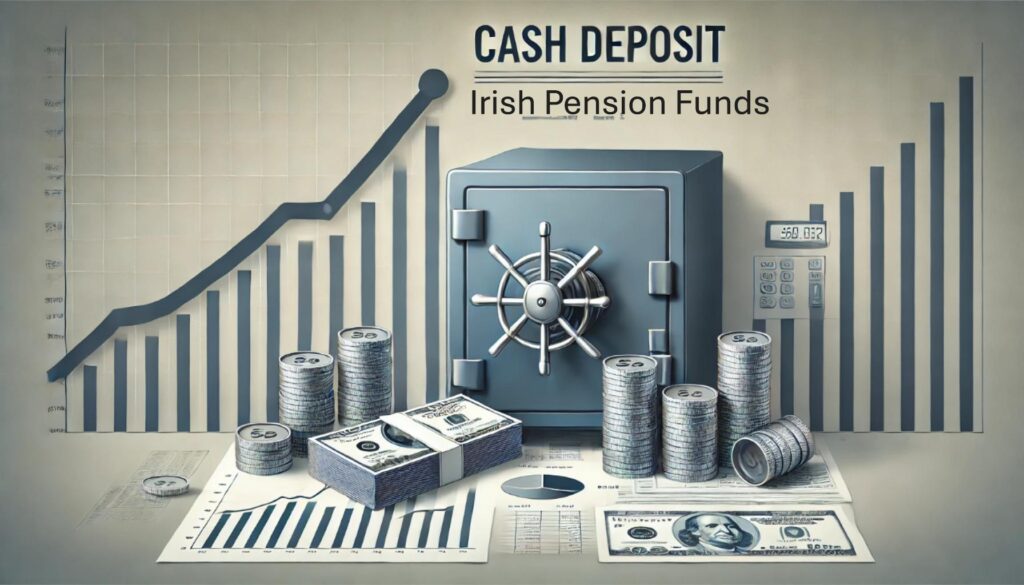
What Are Cash Deposit Pension Funds?
Cash deposit pension funds are low-risk investment vehicles that allocate pension savings primarily into cash deposits held with banks and financial institutions. These funds are designed to preserve capital while generating modest returns through interest accrued on deposits. Unlike equity or bond funds, cash deposit pension funds do not invest in volatile markets, making them a more stable option for risk-averse investors.
Get your own pension review by using the contact options below which suit you
You can choose to get a review on an existing pension and/or enquire about setting up a new plan.
How Do Cash Deposit Pension Funds Work?
When you invest in a cash deposit pension fund, your money is placed in bank deposit accounts, fixed-term savings accounts, and similar cash instruments. The financial institution managing the fund will seek the best possible interest rates while ensuring capital security. The returns on these funds are largely dictated by prevailing interest rates, with higher rates leading to better returns and lower rates resulting in more modest gains.
Who Should Consider Investing in Cash Deposit Pension Funds?
Cash deposit pension funds are not for everyone, but they can be a valuable addition to certain investment strategies. Here are some types of investors who might find them suitable:
1. Conservative Investors
If you prioritize capital preservation over high returns, cash deposit pension funds can be an ideal option. These funds offer security and stability, making them perfect for investors who are risk-averse and prefer to avoid market fluctuations.
2. Retirees and Those Approaching Retirement
As you near retirement, protecting the wealth you have accumulated becomes crucial. Moving a portion of your pension savings into cash deposit pension funds can shield your portfolio from market volatility, ensuring that your savings are available when needed.
3. Investors Seeking Diversification
For those who already have exposure to equities, bonds, and other asset classes, cash deposit pension funds can provide a balance to their portfolio. They act as a hedge against market downturns, offering a steady, secure portion of their pension allocation.
4. Those Concerned About Market Uncertainty
With global markets often facing uncertainty due to economic cycles, geopolitical events, or inflationary pressures, some investors opt to allocate part of their pension funds into cash deposits as a defensive strategy.
Are Cash Deposit Pension Funds a Good Choice in Today’s Economic Environment?
The attractiveness of cash deposit pension funds depends on the broader economic landscape, particularly interest rate trends and inflation levels.
Interest Rate Environment
Interest rates play a crucial role in determining the returns on cash deposit pension funds. In a high-interest-rate environment, these funds can generate decent returns compared to other low-risk assets. However, in a low-interest-rate environment, returns may be minimal, making other investments more attractive.
Currently, central banks have been adjusting interest rates to combat inflation, leading to higher yields on cash deposit funds compared to previous years. If rates remain elevated, these funds could offer better returns than they have in the past decade.
Inflation Considerations
One downside of cash deposit pension funds is their vulnerability to inflation. If inflation is high and the interest earned on deposits is lower than the inflation rate, the real value of your savings could erode over time. Therefore, while these funds provide stability, they may not always be the best option for maintaining purchasing power in an inflationary environment.
Market Volatility and Economic Stability
Given ongoing global economic uncertainties, including potential recessions, geopolitical risks, and stock market fluctuations, having a portion of your pension in cash deposit funds can serve as a safety net. This allocation can provide liquidity and stability during turbulent periods, ensuring you have accessible funds if needed.
Advantages and Disadvantages of Cash Deposit Pension Funds
Advantages:
- Capital Preservation: Your principal amount remains safe, reducing the risk of losses.
- Liquidity: Some funds offer easy access to cash, making it convenient if you need funds quickly.
- Predictable Returns: Unlike equities and bonds, cash deposits offer more stable, though limited, returns.
- Diversification: A good option for balancing risk in a well-rounded pension portfolio.
Disadvantages:
- Low Returns: Typically, cash deposit funds generate lower returns compared to equity and bond investments.
- Inflation Risk: If inflation outpaces interest rates, the real value of savings declines.
- Interest Rate Dependency: Returns fluctuate based on central bank policies and broader economic conditions.
Should You Allocate a Portion of Your Pension to Cash Deposit Funds?
Whether or not to include cash deposit pension funds in your pension portfolio depends on your risk tolerance, financial goals, and the current economic climate. If security and liquidity are priorities, allocating a portion of your pension savings to these funds makes sense. However, for long-term growth, diversifying into other asset classes may be necessary.
Financial advisors at Ocean.ie can help assess your individual needs and guide you in determining the optimal allocation strategy. Contact us today to explore how cash deposit pension funds can fit into your overall retirement plan.
